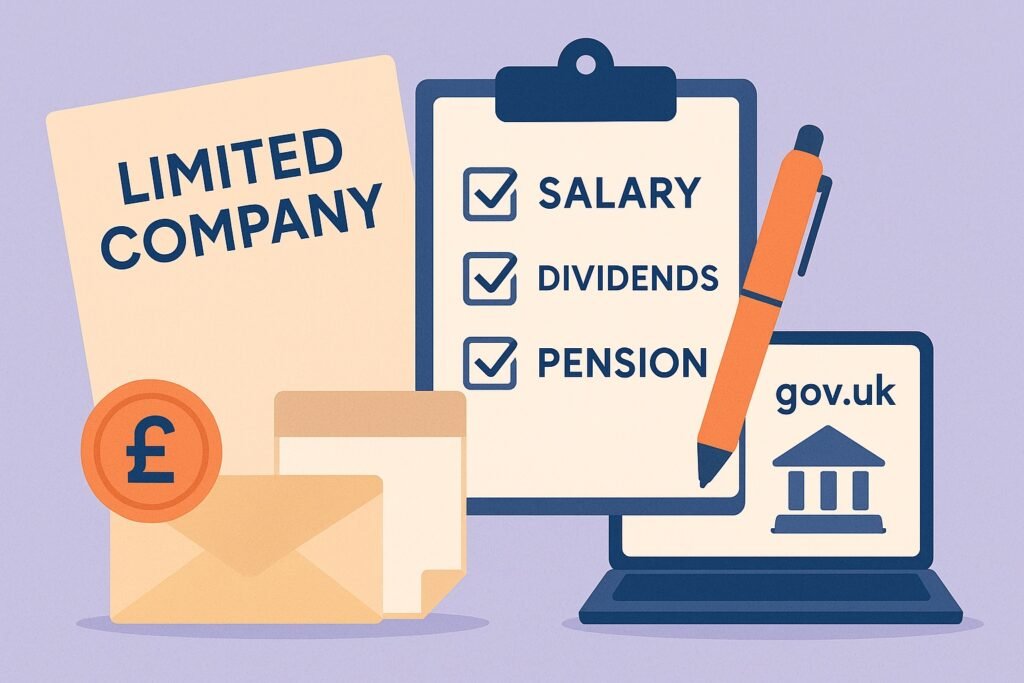
There are a variety of reasons why businesses or consultants may choose to operate through a limited company.
For some, the protection that limited liability offers is a key benefit.
For others, the potential tax benefits are the main reason why they choose to be a limited company over a sole trader.
To explain more about the tax advantages of a limited company, we asked Manchester-based accountants Alexander & Co to outline the tax-effective ways you can pay yourself if you own a limited company.
This guide has been updated for the 2025/26 tax year by the ByteStart team.
1. Paying yourself a salary
Salaries are the most common form of remuneration if you are a business owner. If a company pays salaries, it will operate via the PAYE scheme and report to HMRC through the real-time information system (RTI).
For a business owner operating via a limited company, it is worthwhile considering drawing down a small salary as part of your overall remuneration package.
A salary of at least £6,500 (the Lower Earnings Limit for the 2025/26 tax year) will mean you will still make eligible national insurance contributions towards your state pension.
A salary of up to £12,570 (assuming no other income except dividends) will be covered by your personal allowance and should be free of income tax. No employee’s national insurance is payable either.
Salaries are a deductible business expense for the company, so they will reduce the amount of corporation tax the limited company will need to pay. See our guide: what is Corporation Tax?
Taxation of salaries for the 2025/26 tax year
For the 2025/26 tax year, salaries are taxed as follows:
- The personal allowance is £12,570. Assuming no other income, salaries up to this threshold do not incur tax.
- Between £12,570 and £50,270, a tax rate of 20% applies.
- Between £50,270 and £125,140, a tax rate of 40% applies.
- Over £125,140 a tax rate of 45% applies.
In 2025/26 employees are required to pay the following national insurance contributions.
Class 1 contributions at:
- 8% for salaries ranging between £12,570 and £50,270 per year.
- 2% on earnings above £50,270 per year
In addition, employers must also pay NI contributions:
- 15% class 1 contribution on salaries above £5,000 per year.
Did you know? Employee and employer NICs are never due on dividends, but are always due on salaries.
Salary and NI thresholds for 2025/26
| Item | Amount / rule |
|---|---|
| Lower Earnings Limit (LEL) | £6,500 |
| Primary threshold (employee NI) | £12,570 |
| Secondary threshold (employer NI) | £5,000 |
| Employee NI rates | 8% (£12,570–£50,270), then 2% |
| Employer NI rate | 15% above £5,000 |
| Employment Allowance (EA) | Up to £10,500 (if eligible) |
Lower Earnings Limit (LEL)
£6,500
Primary threshold (employee NI)
£12,570
Secondary threshold (employer NI)
£5,000
Employee NI rates
8% (£12,570–£50,270), then 2%
Employer NI rate
15% above £5,000
Employment Allowance (EA)
Up to £10,500 (if eligible)
Consider the NI thresholds when setting a tax-efficient director’s salary
The lower earnings limit
The LEL for 2025/6 is £6,500 per year. As a director, you will want to earn above this to maintain your entitlement to future benefits and state pensions.
The primary threshold (Employees’ NI)
The primary threshold for 2025/26 is £12,570. The aim is to stay below this. If you earn above this threshold, you will have to start paying NICs.
If you earn over the primary threshold in some weeks or months, you will pay Class 1 NICs (even if your annual income overall is less than the primary threshold).
Fluctuations in earnings may mean you may pay NICs within some periods and not in others, and so budgeting for this is essential.
The secondary threshold (Employers’ NI)
Employers’ NICs are payable above the secondary threshold (£5,000 in 2025/6) at 15%.
So, if you pay a director’s salary at this level, there will be no income tax, or employees’ / employers’ NICs to pay at all.
However, you must earn £6,500 (see above) for your state pension entitlement!
The Employment Allowance
The Employment Allowance (EA) allows business owners and charities to remove up to £10,500 from their national insurance bill each year. Read more: Employment Allowance for limited companies and the official HMRC Employment Allowance page.
First introduced in April 2014, the EA will offset any employers’ NI contributions your company pays during the tax year. However, not all companies are entitled to claim the employment allowance.
Eligibility for the Employment Allowance
A company is not eligible for the Employment Allowance if:
- Only one employee (or director) in the limited company is paid above the Secondary Threshold, which, for the 2025/26 tax year, is £5,000.
- You employ someone for personal, household, or domestic work (unless they’re a care or support worker).
- You’re a service company working under the IR35 rules and your only income is from the earnings of the intermediary.
- You’re a public sector firm doing more than 50% of your work in the public sector (unless you’re a charity).
You can also see: how to set up and run payroll.
2. Paying yourself via dividends
If a limited company has made a profit after paying corporation tax, this can be distributed to the shareholders of the company in the form of dividend payments.
Recipients of dividend payments will need to pay tax on their dividends. Depending on the amount of dividend income, you may be eligible for the tax-free dividend allowance.
For the 2025/6 tax year, the tax-free dividend allowance remains £500. This means that you won’t have to pay any tax on your first £500 of dividend income each tax year.
If you receive over £500 in dividend income, the tax implications are as follows:
- The Personal Allowance for the 2025/26 tax year is £12,570. If your total salary and dividend income for the year falls within this amount, no income tax will be due on them.
- By combining your Personal and Dividend Allowance, you can receive up to £13,070 income free of income tax in the 2025/26 tax year.
- You must pay tax if your combined salary and dividend income exceeds £13,070 in the 2025/26 tax year.
Dividend tax rates for 2025/26
| Band | Tax rate |
|---|---|
| Basic rate (to £50,270) | 8.75% |
| Higher rate (£50,270–£125,140) | 33.75% |
| Additional rate (over £125,140) | 39.35% |
Basic rate
Threshold: to £50,270
Rate: 8.75%
Higher rate
Threshold: £50,270–£125,140
Rate: 33.75%
Additional rate
Threshold: over £125,140
Rate: 39.35%
For more information, read our new guide to the best salary/dividend split for directors and try our limited company tax calculator.
3. Making contributions to your pension
Limited companies can also make pension-linked protection decisions alongside contributions, and can make pension contributions on behalf of their employees or directors.
The pension rules are complex and advice should always be sought, but in very broad terms, the contribution (when the company pays it) is corporation tax-deductible and, assuming the contribution falls within the person’s available pension allowance, it will not be taxed on the individual until they draw it out of the pension.
Even then, the individual, under current rules, has the opportunity to draw out 25% of their pension fund completely free of tax (in most cases).
An individual’s pension annual allowance is usually £60,000 per tax year.
Unused allowances from the previous three tax years can also be used. This can be a very tax-efficient way of extracting funds from a limited company.
Tax-efficient business planning
As mentioned at the beginning of this article, a limited company can be tax-efficient if the circumstances are right; however, not all methods may be suitable for all businesses.
The tax benefit to a company is not the rates of tax at which salary and dividends are charged, but the fact that, as a company owner, it is possible to control when funds are extracted from the business and control the timing of the tax.
See also: limited company taxes overview and limited company expenses.
You may also be able to transfer these funds to other family members who are involved with the company.
In the right circumstances, and with a combination of salary, dividends, and pension contributions, together with distributing wealth around family members, a limited company can help you to achieve a highly tax-efficient business.
Business health warnings
Unfortunately, as with most things in business, tax is not all plain sailing, and there are certain traps you need to be aware of and best avoid.
The list below covers a few of them, but it is by no means comprehensive:
- Directors cannot provide director services from a company. As a result payments for director services will always be subject to PAYE and national insurance.
- A director can provide non-director services from a company, although separate contracts would be required to prove that this is the case.
- If you operate from a company but say, only work for one part of it, then you may be considered an employee by HMRC.
- In these circumstances, your company may be charged PAYE and national insurance on the payments it receives, and the company may also be liable for the employers’ national insurance.
- HMRC may challenge circumstances where they think dividends are being paid instead of a salary. For example, if you grant employees shares where the only rights are to a monthly dividend, HMRC are likely to treat this as salary.
- HMRC may also challenge situations where they see profits being shifted. For example, an 80% shareholder takes a small dividend but pays their spouse, who is a 20% shareholder, a very large dividend to use their allowances.
- Other tax consequences may also need to be considered, such as inheritance or capital gains tax and the consequences of moving shares between family members or other people. With tax efficiency advice from qualified professionals, all of this can be planned for.
Companies can be very tax-efficient vehicles if the circumstances are right. You should work with your tax advisor or accounting firm to ensure that you have the correct structure in place and review it regularly to stay up to date with changing rules and regulations.



